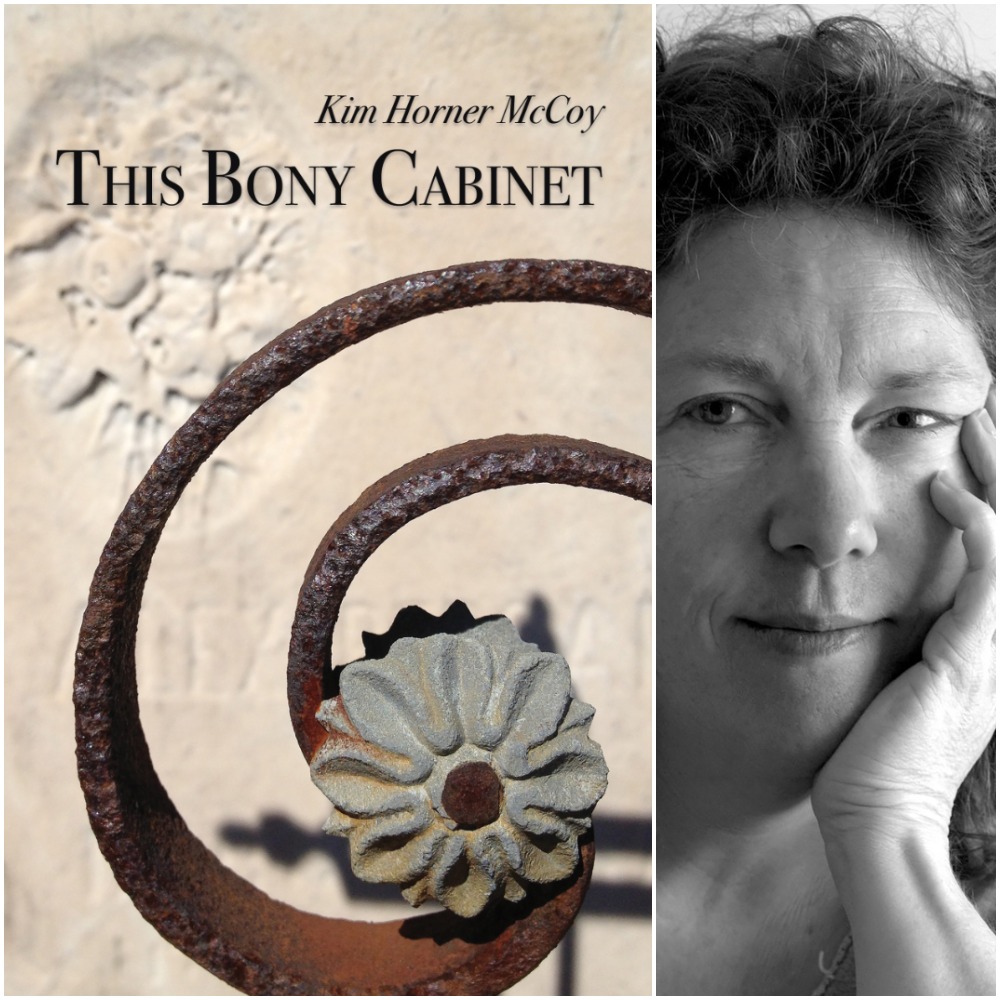Do, please, check out the final stanza of “Flutter” for a nutshell demonstration of sound gorgeously orchestrated in language, or look at the sly echo of “things” and “rings” (with its diminuendo in “tightening” a few lines later) in this collection’s first poem. But I don’t want to imply that This Bony Cabinet is just one long tone poem. Billy the Kid awaits you here, and the architect Louis Sullivan, and the three major icons of twentieth century physics/cosmology, and ••• well, maybe the heart of your own bony cabinet is knocking inside these lines too. Enjoy!
–Albert Goldbarth, two-time winner of the National Book Critics Circle award
The terrain of the poems in Kim Horner McCoy’s This Bony Cabinet includes roadside memorials, architectural monuments, and Interstate mileposts along a lightly-peopled diagonal between Chicago and eastern New Mexico. Birds frozen in sculpture, the shock of world events rattling the order, a way woke coyote tale, F5 tornadoes, weaponized airplanes falling from the sky, coiled rattlesnakes beside the trail – McCoy writes with lithographic remembrance, cataloguing unexpected detours, missing sections of map, and the lingering effects of disasters – both personal and collective – in her journey through early 21st Century America.
–George Frazier, author of The Last Wild Places of Kansas
Kim Horner McCoy writes from her soul. The poems in THIS BONY CABINET reveal an ear for language and a voice all her own. A mesmerizing debut.
–Johnny D. Boggs, eight-time Spur Award winner
Inspired and unsettling, the images in This Bony Cabinet—be they personal or historic, political or religious, artistic or every day, born of the natural world or man-made super structures—remain long after the echoing refrain of life-death, life-death, and all that lies between first breath and last exhalation. Full of the exceptional and unexpected, revealing culture clashes, natural disasters, human terror, and intense individual observation, the poems challenge, both intellectually and emotionally, our ability to comprehend the awful ticking of the clock towards an inevitable—and often unprecedented—end. Here abides not only the power of story, but magical imaginings, brilliance, a fine meeting of sound created by odd words and poignant phrasing that stabs with clarity, then soothes with tender acceptance. What an impressive learning experience Kim Horner McCoy grants the reader—an opportunity to peek into people, places and events that are chock full of forgotten fragments, fragile skeleton secrets, and memorable resilience.
–Laurie Wagner Buyer, author of Across the High Divide and Reluctant Traveler
This book cannot be a casual read. It challenges feelings of indifference and provokes an obligation from the reader to stop, examine, feel, and reflect. I truly enjoyed this book, even though I was convicted through most of it.
–Linda Apple, author of Write Life and Women of Washington Avenue
Archaeological, forensic, and richly contemplative, these poems position McCoy as witness and interlocutor of calamity. “As with all questions,” she writes, “destruction is a matter of point of view.” Directing her gaze through the framing of art, photography, and history, McCoy attests to both the insufficiency and the prisming possibilities inherent in the work of any chronicler who attempts to fix a subject within a lens.
In examples from science, history, architectural photography, journalism, and personal life, McCoy highlights how the edge of any frame implies the intentions of the framer and calls attention to what has been implied or left out.
It is there, in the negative space, that McCoy creates a new vantage on her subjects. She paints objects with the shadows they cast and traces the impact of events through their aftermath. These poems sift through detritus, the “scrap and gristle” of gravesites, broken buildings, and storm paths littered with canceled checks and paper pulping in a field. The remnants evoke stories and suggest the fragmentary fragility of our lives. They imply the terrifying scale of events, a leviathan glimpsed by its bones.
While these poems invite new perspectives on loss, tragedy, calamity (storms, suicide, accidents experienced and averted), their effect is not elegiac, but epistemological. In striking observations such as the “sun load” of the World Trade Center or the reflective capacity of the color blue in the sky that we remember framing it during the 9/11 attack, McCoy leads the reader to investigate what and how we know.
The compassion with which she observes these fragments dissolves the margins between individual and collective suffering, highlighting how our pain calls to other pain, how “we are each other’s disasters.” These are sharp shards, meditatively sifted and reconfigured into a chandelier of eerily lovely, refracting glass. These poems are wise, thoughtful, simmering and shimmering.
–Amy Sage Webb-Baza, author of Save Your Own Life.
This Bony Cabinet is a title suggestive of the fragility voiced by the poems within it. These pieces deal delicately with the architectures of place, loss, and the walks we take toward meaning. Whether grounding us in the metal and beams of Chicago or the “flinty earth of Kansas,” Kim Horner McCoy’s poems work like tightly crafted prose, building their stories from weather, history, and found objects—as all my favorite poems do.
–Joey Brown, Author, Oklahomaography and The Feral Love Poems






Reviews
There are no reviews yet.